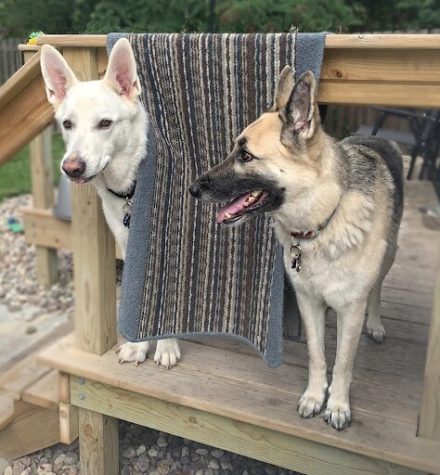Smaller the Dog, Bigger the Bite

Two German Shepherds that have been fostered / owned by Angela Zdroik.
December 16, 2022
Have you ever been bitten by a dog? If so, did you expect it? Dog owners should understand the background and stereotypes behind these attacks before they fall victim to their own furry friend. Many fearful ideas circulate involving large dogs and their aggression, however few believers of those fallacies actually know the real truth in a dog’s behavior.
Evidence
Dog’s behaviors are defined by the characteristics of an owner. A study done by two students at University of Ljubljana displays this connection. In this trial 42 dog and owner pairs were used, featuring a variety of dog breeds and genders all over the age of one year. Collecting data from owner reported surveys and behavioral testing of the dogs, the researchers found that the owner’s personality traits correlated with their dogs behavior due to both shared living space and the owners selection process during the time acquired. If proper living accommodations are not accounted for, difficult behaviors are probable in any dog.
Statistics
Despite the common stereotype that large dogs are more aggressive, evidence shows otherwise. In a survey conducted on 48 SPASH students, 60% of them have been bitten by a small dog hard enough to draw blood, whereas less than 20% have had those experiences with large dogs. These survey results correlate that the majority of students have a more troubling history with small dogs than large.
Experience
The aggression stereotype is not only harmful to dogs, but to humans as well. Angela Zdroik, long-term German Shepherd foster & volunteer, explained the importance in debunking this stigma. Large dogs are often “automatically pegged as vicious” due to their size and capabilities. Owning a dog in this category commonly leads to more expensive liability insurance and reduced housing options when looking for renters, simply based on the assumption that harm will be done.
As most of us know, changing people’s opinions can be hard, however it is a vital step when participating in the solution to this stereotype. Most people with negative attitudes towards large dogs are unknowingly misinformed, “When you have an uninformed populace, society as a whole suffers.” says Zdroik. Dissolving this stigma can be approached by encouraging those surrounding you to visit pet expos, using reputable rescue groups, but most importantly, treating your animals with respect.





































































